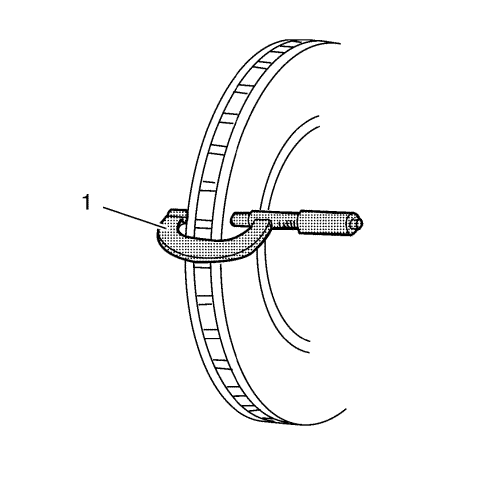Brake Disc Thickness Measurement
Warning: Refer to Brake Dust Warning in the Preface section.
- If the inboard friction surface of the brake rotor is not accessible, reposition and support the caliper with the brake pads. Refer to Front Disc Brake Pads Replacement .

- Clean the friction surfaces of the brake rotor with denatured alcohol, or an equivalent approved brake cleaner.
- Using a micrometre (1) calibrated in thousandths-of-a-millimetre, or ten-thousandths-of-an-inch, measure and record the thickness of the brake rotor at four or more points, evenly spaced around the brake rotor.
Make sure that the measurements are only taken within the friction surfaces and that the micrometre is positioned the same distance from the outer edge of the brake rotor, about 13 mm (1/2 in), for each measurement.
- Compare the lowest thickness measurement recorded to the following specifications:
Specification - Front
| • | Brake rotor minimum allowable thickness after refinishing: 18.20 mm (0.717 in) |
| • | Brake rotor discard thickness: 18.00 mm (0.709 in) |
- If the lowest thickness measurement of the brake rotor is above the minimum allowable thickness after refinishing specification, the brake rotor may be able to be refinished, depending upon surface and wear conditions which may be present.
- If the lowest thickness measurement of the brake rotor is at or below the minimum allowable thickness after refinishing specification, the brake rotor may not be refinished.
- If the lowest thickness measurement of the brake rotor is at or below the discard thickness specification, the brake rotor requires replacement.
| © Copyright Chevrolet. All rights reserved |
